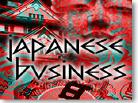|
'Sokaiya' scams hit Japan
|
 |
December 19, 1997: 6:03 p.m. ET
Japanese companies ill-equipped to deal with corporate extortionists
|
NEW YORK (CNNfn) - They are know as "sokaiya," and they are corporate extortionists that prey upon the Japanese desire to maintain at least the outward appearance of harmony and avoid public humiliation.
Sokaiya threaten to disrupt the annual shareholder meetings of Japanese companies -- offering their silence in exchange for money, according to Hugh Patrick, professor of international law at Columbia University's East Asian institute.
Companies pay these enforcers to keep the peace because they've never learned to deal with questions and proposals from their own shareholders, experts say.
"It's a sensitive topic now in Japan," Patrick said. "The whole issue of corporate governance and shareholder rights is one the Japanese are having trouble dealing with."
The relationship between Japanese firms and the sokaiya is complex. On the one hand, companies pay sokaiya to make sure annual meetings run smoothly -- in the same way a U.S. company would hire a public relations firm, Patrick said.
But on the other hand, sokaiya often learn secrets about companies and threaten to expose them unless they get money, Patrick said. Part of the reason the sokaiya thrive is that companies in Japan don't release nearly as much information to shareholders as businesses do in the United States.
"Disclosure is much less comprehensive in Japan than it is in the United States, so there are a lot more secrets floating around," Patrick said.
Most recently, Japan imposed tough penalties on Daiwa Securities and Nikko Securities for allegedly making payoffs. Both brokerages were temporarily banned from trading.
Four executives at Mitsubishi Motors Corp. were arrested for alleged payoffs disguised as "rent" for a bogus vacation home.
And in another well-publicized case, three top executives at Nomura Securities pleaded guilty in a scandal involving millions of dollars. Nomura paid a big fine and was banned from trading temporarily.
Patrick said the Nomura case was unique because the sokaiya actually owned enough stock of the company to propose a candidate for the board of directors. In Japan, shareholders can propose candidates on the proxy statement. U.S. shareholders can only propose resolutions on proxies.
In the meantime, Japan is working hard at reform.
"Certainly they (the Japanese) are working hard to clean it up because it's been a great embarrassment," Patrick said.
|
|
|
|
|
 |

|

